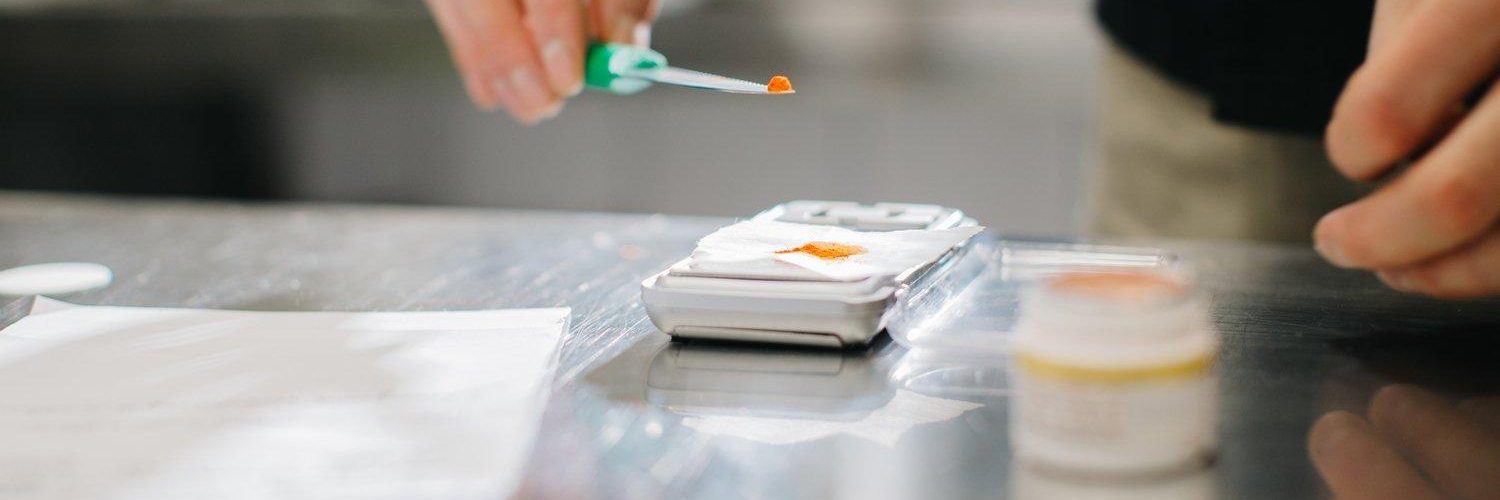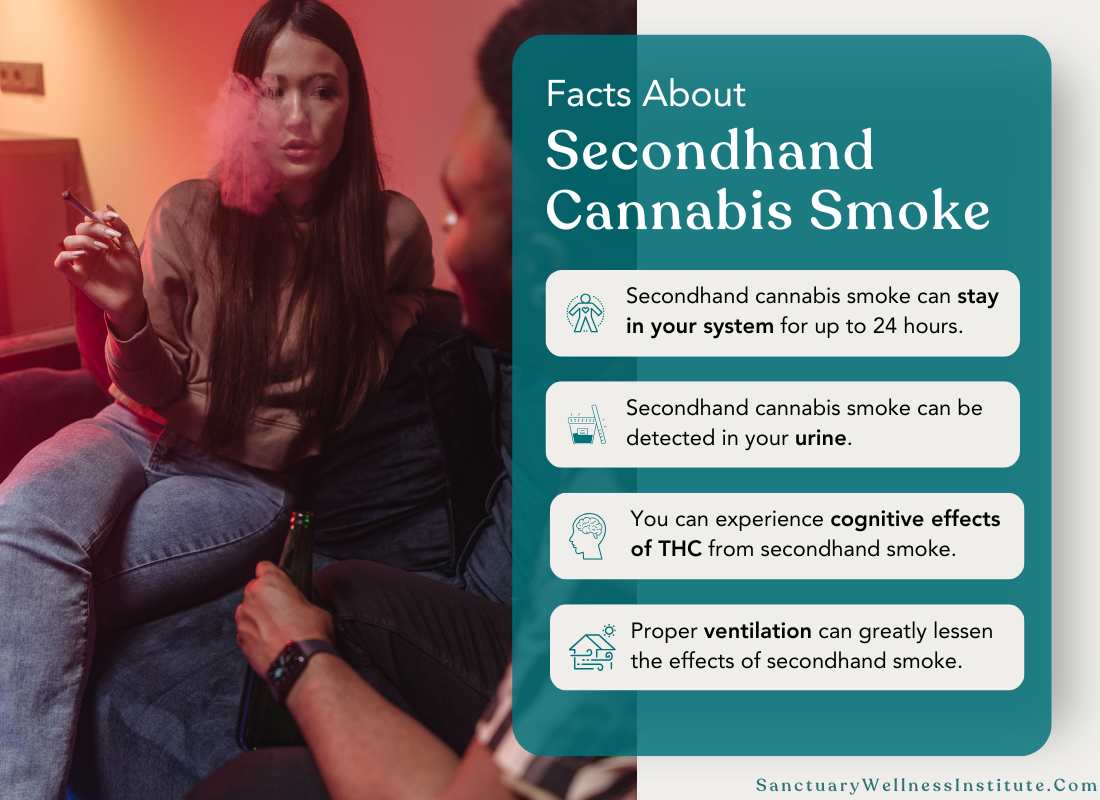Can You Fail a Drug Test from Secondhand Smoke?
- John DiBella
- Published: February 27, 2023
- Updated: March 28, 2024
- Fact-checked by Dr. Desiree Granados

Whether you’re sitting in a room with colleagues at a casual gathering or attending a concert, the possibility of inhaling secondhand smoke inevitably arises. If you believe you’ve inhaled cannabis smoke, you might be wondering whether or not this exposure can influence the results of a drug test. In this article, we’ll delve into the science behind secondhand smoke exposure and its potential impact on drug testing.
What Is Secondhand Smoke?
Secondhand smoke is the smoke exhaled by someone who is smoking cannabis or the smoke that comes directly from a burning cannabis product. Similar to secondhand tobacco smoke, secondhand cannabis smoke contains a mixture of harmful chemicals and particles that can affect indoor air quality and pose health risks to exposed non-smokers, especially those with pre-existing health conditions.
How Long Does Secondhand Smoke Stay in Your System?
The duration secondhand cannabis smoke stays in one’s system can vary based on several factors, including the amount of smoke inhaled, the potency of the cannabis, and the individual’s metabolism.
But according to the limited research into the question, traces of THC (tetrahydrocannabinol), the psychoactive component in cannabis, can be detected in the body of a non-smoker who has been exposed to secondhand cannabis smoke for up to 24 hours.
Can Secondhand Smoke Be Found in Urine?
Secondhand cannabis smoke can indeed be detected in the urine of non-smokers. Studies have demonstrated that individuals exposed to high levels of cannabis smoke in a closed environment can test positive for THC in their urine, but only within a limited window of time. This is because secondhand smoke contains small particles and chemicals that can be absorbed by the body through inhalation and ingestion.
However, it’s important to note that the levels of THC found in urine from secondhand smoke are significantly lower than those found in urine from direct cannabis consumption. The amount of THC that can be detected in a non-smoker’s urine will also depend on the duration and intensity of their exposure to secondhand smoke.
How Much Secondhand Smoke Does it Take to Affect You?
Even minimal exposure to secondhand cannabis smoke can have perceptible effects, though the smoke’s impact can vary depending on factors such as its concentration, the duration of exposure, and the ventilation of the environment.
Studies suggest that being in a poorly ventilated room for just a few hours with lingering cannabis smoke can result in enough absorption of THC to induce detectable cognitive impairment. However, more research is needed to understand the full extent of these effects and the minimum exposure necessary to cause them.

Is Secondhand Smoke Worse Than Smoking?
Direct cannabis consumption involves inhaling smoke into the lungs, where it can cause respiratory issues and other health problems. That said, exposure to secondhand smoke carries its own risks. Studies indicate that secondhand cannabis smoke contains many of the same toxins and carcinogens found in tobacco smoke, posing health risks to non-smokers (especially those in closed spaces without proper ventilation).
Smoking cannabis yourself poses more risks to your health than inhaling secondhand cannabis smoke. But in general, avoiding exposure to any smoke, whether firsthand or secondhand, is advisable.
Can Secondhand Smoke Cause Addiction?
Research into whether passive exposure to cannabis smoke can lead to addiction is still in its early stages. That said, while direct inhalation of cannabis smoke can lead to addiction, passive exposure through secondhand smoke is unlikely to contain sufficient amounts of THC to cause addiction.
However, continuous and prolonged exposure to secondhand cannabis smoke in poorly ventilated spaces can put you at risk of experiencing minor psychoactive effects.
How Do You Reduce Exposure to Secondhand Smoke?
Reducing secondhand cannabis smoke is crucial to maintaining a healthy living environment, especially for those with respiratory issues or for households with children. Here are some actionable steps you can take:
- Create Smoke-Free Zones: Establish areas within your home and vehicle(s) that are strict no-smoking zones. Encourage household members and guests to respect these boundaries to minimize indoor air contamination.
- Use Air Purifiers: Investing in air purifiers with HEPA filters can eliminate smoke particles from the air and contribute to a cleaner breathing environment.
- Increase Ventilation: Whenever possible, increase the flow of outdoor air into the home by opening windows and doors (unless the outdoor air quality is poor). This can help clear out any smoke that does get inside.
- Advocate for Smoke-Free Policies: In multi-unit housing, work with property management to advocate for smoke-free building policies that include cannabis smoke. This can protect everyone’s right to breathe clean air in shared spaces.
- Educate and Communicate: Share your concerns about secondhand smoke with friends and family members who use cannabis. Open communication can facilitate compromise, such as using edibles or vaping (with caution regarding indoor air quality) instead of smoking around non-users.
Conclusion
Understanding and mitigating the impact of secondhand cannabis smoke is vital to safeguarding your health, particularly in environments shared with non-smokers and vulnerable individuals. While direct consumption of cannabis poses its own health risks, the presence of toxic chemicals in secondhand smoke underscores the need for awareness and preventive action.
By adopting smoke-free zones, improving ventilation, and considering healthier alternatives to smoking, you can significantly reduce the risks associated with secondhand smoke exposure.
If you’re interested in using marijuana to improve your health, the Sanctuary Wellness Institute can help you start that journey. Not only can we connect you with a medical marijuana doctor who can certify you for medical cannabis treatment, but we can guide you through the process of applying for a medical marijuana card.
When you choose the Sanctuary, you choose a partner committed to educating and empowering you so you can elevate your well-being.
States Where We Offer Medical Marijuana Card Services
How we reviewed this article:
- Dominion Diagnostics (2024). Study Finds Positive Drug Test from Secondhand Marijuana Smoke Unlikely https://www.dominiondiagnostics.com/news/study-finds-positive-drug-test-secondhand-marijuana-smoke-unlikely
- Edward J. Cone,, George E. Bigelow, Evan S. Herrmann, John M. Mitchell, Charles LoDico, Ronald Flegel, and Ryan Vandrey (2015). Non-Smoker Exposure to Secondhand Cannabis Smoke. I. Urine Screening and Confirmation Results https://www.ncbi.nlm.nih.gov/pmc/articles/PMC4342697/
- National Institute on Drug Abuse (2020). What are the effects of secondhand exposure to marijuana smoke? https://nida.nih.gov/publications/research-reports/marijuana/what-are-effects-secondhand-exposure-to-marijuana-smoke
- Centers for Disease Control and Prevention (2020). Lung Health https://www.cdc.gov/marijuana/health-effects/lung-health.html
- Centers for Disease Control and Prevention (2020). Secondhand Marijuana Smoke https://www.cdc.gov/marijuana/health-effects/second-hand-smoke.html
- Paul Frysh (2024). How Pot Affects Your Mind and Body https://www.webmd.com/mental-health/addiction/marijuana-use-and-its-effects
- Anna Smith Haghighi (2020). What are the side effects of secondhand marijuana smoke? https://www.medicalnewstoday.com/articles/side-effects-of-secondhand-marijuana-smoke
- Sanuvox (2023). The Best Air Purifier For Cannabis Smoke & Smell https://sanuvox.com/en/blog/the-best-air-purifier-for-cannabis-smoke-smell/
- American Nonsmokers’ Rights Foundation (2023). Secondhand Marijuana Smoke https://no-smoke.org/secondhand-marijuana-smoke-fact-sheet/
Current Version
March 28, 2024
Updated By
Jake Peter
Fact-checked By
Dr. Desiree Granados
Editorial Process
Our Editorial Process
First Published
February 27, 2023
Written By
John DiBella
Fact-checked By
Dr. Desiree Granados
Editorial Process
Our Editorial Process

John DiBella is the co-founder and CEO at The Sanctuary Wellness Institute. His goal is to foster healthier lifestyles to improve individuals’ quality of life and health span through online medical and non-medical services. When he’s not writing health & wellness articles for The Sanctuary, he enjoys hiking, camping, surfing and sailing.







